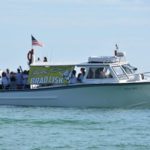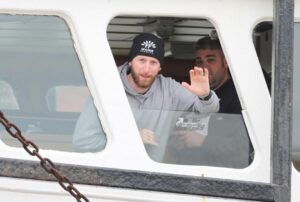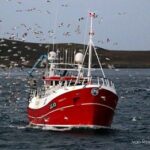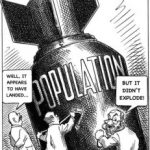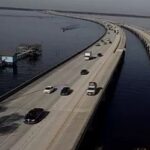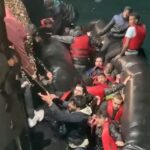Tag Archives: Puget Sound
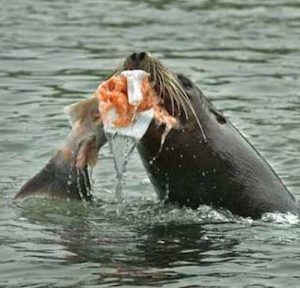
Endangered orcas compete with seals, sea lions for salmon
Harbor seals, sea lions and some fish-eating killer whales have been rebounding along the Northeast Pacific Ocean in recent decades. But that boom has come with a trade-off: They’re devouring more of the salmon prized by a unique but fragile population of endangered orcas. Competition with other marine mammals for the same food may be a bigger problem than fishing, at least in recent years, for southern resident killer whales that spend time in Washington state’s Puget Sound, a new study suggests. click here to read the story 07:43
Stormwater pollution in Puget Sound streams killing coho before they can spawn
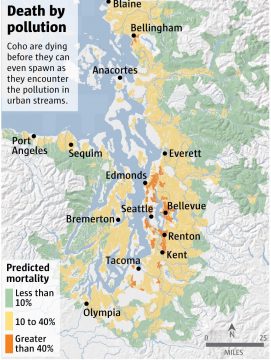 The sweet seep of autumn rain is bringing coho salmon back home to their natal streams all over the Puget Sound basin — where too often they encounter a bitter truth: pollution in a shocking 40 percent of their home range so bad it can inflict a swift death. The culprit is stormwater, and it is causing death rates so high, some populations of wild coho are at risk of local extinction, researchers found.The stormwater problem has long bedeviled the region. click here to read the story 13:14
The sweet seep of autumn rain is bringing coho salmon back home to their natal streams all over the Puget Sound basin — where too often they encounter a bitter truth: pollution in a shocking 40 percent of their home range so bad it can inflict a swift death. The culprit is stormwater, and it is causing death rates so high, some populations of wild coho are at risk of local extinction, researchers found.The stormwater problem has long bedeviled the region. click here to read the story 13:14
A Northwest tribal sovereignty battle, centered on culverts – click here to read the story
More Atlantic salmon coming to Puget Sound despite objections
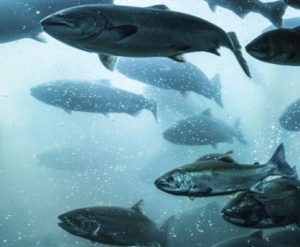 The company that spilled thousands of invasive salmon into Puget Sound is sending 1 million more into local pens despite objections from state officials. “We are very concerned about Cooke Aquaculture’s plan to transfer up to 1 million Atlantic salmon smolts to a in Clam Bay across from Bainbridge Island. This is disappointing and frustrating, coming on the heels of the August collapse of Cooke’s net pen near Cypress Island that held 305,000 fish,” Washington Governor Jay Inslee said. click here to read the story 10:15
The company that spilled thousands of invasive salmon into Puget Sound is sending 1 million more into local pens despite objections from state officials. “We are very concerned about Cooke Aquaculture’s plan to transfer up to 1 million Atlantic salmon smolts to a in Clam Bay across from Bainbridge Island. This is disappointing and frustrating, coming on the heels of the August collapse of Cooke’s net pen near Cypress Island that held 305,000 fish,” Washington Governor Jay Inslee said. click here to read the story 10:15
State gives OK to new salmon farm permit – The state found, however, that Fish and Wildlife didn’t have the authority to deny a permit to transfer fish into an existing pen, according to the joint release from Inslee and Franz. click here to read the story 10:42
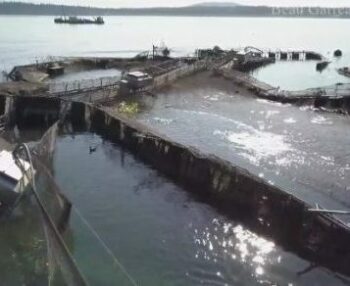
Protest seeks shutdown of Atlantic salmon farms in Washington state
Activists in Washington state plan to launch a protest flotilla on Saturday in the Pacific Ocean’s Puget Sound over the accidental release of tens of thousands of farm-raised Atlantic salmon that they say threaten dwindling stocks of wild fish. The afternoon protest, which seeks to shut down farms that raise the non-native salmon in underwater pens, is expected to draw dozens of boats, kayaks and canoes on a route along the San Juan Islands where the spill happened. That raised fears they would compete with wild fish for food, prey on the young, and expose them to disease. Protesters said native fish like Chinook salmon and steelhead trout were already struggling before the spill. click here to read the story 13:26
Fugitive Farmed Atlantic salmon ‘heading to every river in Puget Sound’
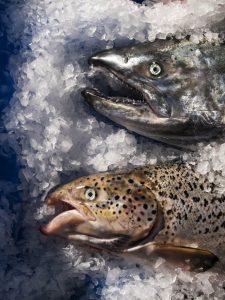 The Lummi Nation is marshaling a mop-up of thousands of fugitive Atlantic salmon in the tribe’s territorial waters, and the Swinomish chairman has called for a shutdown of the farmed-salmon industry in Puget Sound after last weekend’s spill. Swinomish fishermen caught farmed Atlantic salmon in the Skagit River on Wednesday night, as the fish continued to disperse through the Puget Sound, said Brian Cladoosby, chairman of the Swinomish Indian Tribal Community. He also received a report of an Atlantic salmon caught off Alki Point on Thursday afternoon. “These fish are headed to every river in Puget Sound,” Cladoosby said. “We have been saying all along it was not a question of if, but when, this would happen. click here to read the story 23:27
The Lummi Nation is marshaling a mop-up of thousands of fugitive Atlantic salmon in the tribe’s territorial waters, and the Swinomish chairman has called for a shutdown of the farmed-salmon industry in Puget Sound after last weekend’s spill. Swinomish fishermen caught farmed Atlantic salmon in the Skagit River on Wednesday night, as the fish continued to disperse through the Puget Sound, said Brian Cladoosby, chairman of the Swinomish Indian Tribal Community. He also received a report of an Atlantic salmon caught off Alki Point on Thursday afternoon. “These fish are headed to every river in Puget Sound,” Cladoosby said. “We have been saying all along it was not a question of if, but when, this would happen. click here to read the story 23:27
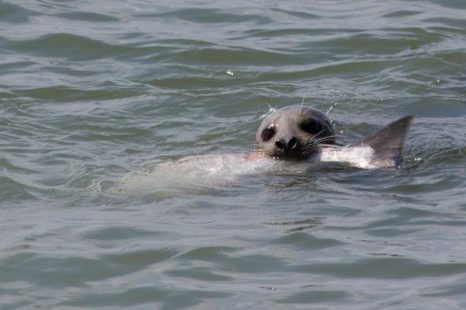
Study says predators may play major role in chinook salmon declines
A new study shows that increased populations of seals and sea lions are eating far more of Puget Sound’s threatened chinook than previously known, potentially hampering recovery efforts for both salmon and endangered killer whales. Seals and sea lions are eating about 1.4 million pounds of Puget Sound chinook each year — about nine times more than they were eating in 1970, according to the report, published online this month in the Canadian Journal of Fisheries and Aquatic Sciences. Most of these chinook are small fish migrating to the ocean, which ultimately reduces the number of adults returning to Puget Sound. The study estimates that seals and sea lions are decreasing potential returns by about 162,000 adult chinook each year. That’s twice the number eaten by killer whales and roughly six times as many as caught in Puget Sound by tribal, commercial and recreational fishers combined. Read the rest of the story here 21:16
Invader green crabs from Europe threaten havoc in Puget Sound
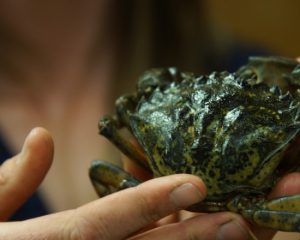 Emily Grason and Sean McDonald trudge through the mud of San Juan Island’s Westcott Bay on the hunt for something they hope not to find: A 3-inch menace: the European green crab. In late August, a single adult male was found for the first time in Washington’s inland sea. University of Washington researchers responded, arriving at the location of that first sighting with hundreds of traps in tow. “It might seem like it’s crazy for us to have such an intense trapping effort for just a single crab being found. One crab, what’s the big deal?” says Emily Grason, project coordinator for the Washington Sea Grant Crab Team. “But these crabs do tend to show up in numbers and where there’s one, there’s often more.” Video, read the story here 17:24
Emily Grason and Sean McDonald trudge through the mud of San Juan Island’s Westcott Bay on the hunt for something they hope not to find: A 3-inch menace: the European green crab. In late August, a single adult male was found for the first time in Washington’s inland sea. University of Washington researchers responded, arriving at the location of that first sighting with hundreds of traps in tow. “It might seem like it’s crazy for us to have such an intense trapping effort for just a single crab being found. One crab, what’s the big deal?” says Emily Grason, project coordinator for the Washington Sea Grant Crab Team. “But these crabs do tend to show up in numbers and where there’s one, there’s often more.” Video, read the story here 17:24
Talks break down again between state, tribes to develop a joint plan for Puget Sound salmon fisheries
 State and tribal fishery officials are again at an impasse over efforts , and it is uncertain when — or even if — a new season might open this year for sport anglers and nontribal, commercial fishermen. The talks this year have been complicated by forecasts for extremely poor returns of wild coho, which require harvest cuts to protect the weak runs. Rather than submit a joint plan for federal approval as in years past, both state and tribal officials now say they plan to submit separate management plans to NOAA (National Oceanic and Atmospheric Administration) Fisheries. Tribal officials expect they could,,, Read the rest here 10:53
State and tribal fishery officials are again at an impasse over efforts , and it is uncertain when — or even if — a new season might open this year for sport anglers and nontribal, commercial fishermen. The talks this year have been complicated by forecasts for extremely poor returns of wild coho, which require harvest cuts to protect the weak runs. Rather than submit a joint plan for federal approval as in years past, both state and tribal officials now say they plan to submit separate management plans to NOAA (National Oceanic and Atmospheric Administration) Fisheries. Tribal officials expect they could,,, Read the rest here 10:53
Impasse between fishery and tribal leaders puts Puget Sound salmon season in jeopardy
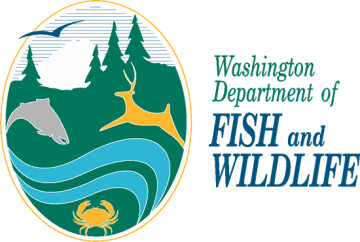 State fishery managers announced late Tuesday they had reached an impasse with tribal leaders over a salmon season this summer. It will now be in the hands of the federal government to make the final decision that will affect the livelihoods thousands of people connected to the salmon fishery. Officials with the Washington Department of Fish and Wildlife are uncertain if a permit will be issued in time to hold recreational and non-tribal commercial fisheries in Puget sound. “This isn’t the outcome we had hoped for, but we will do our best to obtain a federal permit as quickly as possible,” said Ron Warren, head of WDFW’s Fish Program said in a statement Read the rest here 11:56
State fishery managers announced late Tuesday they had reached an impasse with tribal leaders over a salmon season this summer. It will now be in the hands of the federal government to make the final decision that will affect the livelihoods thousands of people connected to the salmon fishery. Officials with the Washington Department of Fish and Wildlife are uncertain if a permit will be issued in time to hold recreational and non-tribal commercial fisheries in Puget sound. “This isn’t the outcome we had hoped for, but we will do our best to obtain a federal permit as quickly as possible,” said Ron Warren, head of WDFW’s Fish Program said in a statement Read the rest here 11:56
Fish found in Washington’s Puget Sound are tripping on cocaine, Prozac, Advil, Benadryl, and Lipitor.
 Unfortunately, there is no aquatic drug dealer responsible for it. Instead, the intoxication is the result of tainted discharge water. Pharmaceutical pollution could be to blame for the many drugs showing up in the tissues of juvenile Chinook salmon. Estuary waters near the sewage treatment plants were found to contain a cocktail of up to 81 different drugs, according to a new study out of the National Oceanie and Atmospheric Administration (NOAA). There are several plausible theories about the Puget Sound’s high concentration of . Jim Meador, an environmental toxicologist at the NOAA’s Northwest Fisheries Science Center in Seattle, published a study that offered two options. Read the rest here 14:03
Unfortunately, there is no aquatic drug dealer responsible for it. Instead, the intoxication is the result of tainted discharge water. Pharmaceutical pollution could be to blame for the many drugs showing up in the tissues of juvenile Chinook salmon. Estuary waters near the sewage treatment plants were found to contain a cocktail of up to 81 different drugs, according to a new study out of the National Oceanie and Atmospheric Administration (NOAA). There are several plausible theories about the Puget Sound’s high concentration of . Jim Meador, an environmental toxicologist at the NOAA’s Northwest Fisheries Science Center in Seattle, published a study that offered two options. Read the rest here 14:03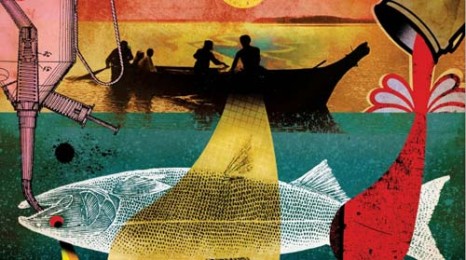
Loving the Puget Sound to Death
Hidden amid the pleasure boats and cargo ships that roar through the canal in northwest Seattle is one of the oldest fishing economies in North America. From midsummer to October, from early morning until after dusk, fishermen from the Suquamish Tribe zoom up and down the canal in orange waterproof overalls, tending to salmon nets that dangle across the water like strings of pearls. The story of water pollution in Puget Sound mirrors that of other urban areas in the country. In the mid-twentieth century, the damage caused by waste and industrial pollution became obvious. Read the rest here 08:08
Warm waters strain shared BC-Washington salmon fishery – So what happened this year?
 The Memories has been in Chuck Horjes’s family for 54 years. He began as a teenage deckhand in the 1970s, eventually working his way up to his current position as captain of the 54 foot commercial fishing vessel. Over the years he has travelled up and down the West Coast from Alaska to Oregon in search of salmon. This year he decided to fish an area known as the “salmon traps” near the San Juan Islands in Washington, Read the rest here 06:45
The Memories has been in Chuck Horjes’s family for 54 years. He began as a teenage deckhand in the 1970s, eventually working his way up to his current position as captain of the 54 foot commercial fishing vessel. Over the years he has travelled up and down the West Coast from Alaska to Oregon in search of salmon. This year he decided to fish an area known as the “salmon traps” near the San Juan Islands in Washington, Read the rest here 06:45
New Puget Sound smelt fishing regulations hope to stop decline in population
 The state Fish and Wildlife Commission has taken on new measures for smelt fishing in Puget Sound to keep the populations from dwindling. “The new regulations preserve sport and commercial fishing opportunities while providing needed protection for smelt,” Wecker said. The new regulations are: Read more here 15:34
The state Fish and Wildlife Commission has taken on new measures for smelt fishing in Puget Sound to keep the populations from dwindling. “The new regulations preserve sport and commercial fishing opportunities while providing needed protection for smelt,” Wecker said. The new regulations are: Read more here 15:34
Department of Fish and Wildlife reviews Puget Sound commercial and recreational smelt regulations
 “These forage fish are essential to the health of Puget Sound, where over the last several years we have seen an increase in the harvest of smelt,” Burley said in a news release. “So we’d like to discuss the current regulations to help ensure we have the appropriate harvest levels to continue to sustain the population. Read more Pew here the newstribune.com 13:26
“These forage fish are essential to the health of Puget Sound, where over the last several years we have seen an increase in the harvest of smelt,” Burley said in a news release. “So we’d like to discuss the current regulations to help ensure we have the appropriate harvest levels to continue to sustain the population. Read more Pew here the newstribune.com 13:26
National Marine Fisheries Service : These Orca’s are Special! tu parli l’inglese?

The National Marine Fisheries Service spent a year reviewing a petition to delist the orcas from the Endangered Species Act. “We have decided these killer whales are a distinct population group,” Gorman said. “They have their own language, own food source. They don’t interbreed with other groups of killer whales. They meet the legal standard for a distinct population group.” continued@katu
(I dunno. They look the same, but I don’t speak the language!)
Washington Fish and wildlife officers on patrol for poachers
Sgt. Erik Olson and Officer Mike Apple were looking for crab poachers in the central Puget Sound area Monday. video@kirotv
Puget Sound can’t heal itself – We can no longer put off the work needed to restore valuable waters, By Dave Somers
![]() On a nice day, looking out from Everett across Port Gardner toward the Olympic Mountains, it is excusable to think all is well. The water is blue, the seagulls soar, and the boats cut back and forth. Do not be lulled by this vision. Past generations can be forgiven for not understanding the negative effects of their actions. We cannot claim the same excuse. continued
On a nice day, looking out from Everett across Port Gardner toward the Olympic Mountains, it is excusable to think all is well. The water is blue, the seagulls soar, and the boats cut back and forth. Do not be lulled by this vision. Past generations can be forgiven for not understanding the negative effects of their actions. We cannot claim the same excuse. continued
The US Coal Industry Wants to Boost Exports to Asia – Native American Tribes Stand in the Way – Lhaq’temish – People of the Sea
The gray waters of the Puget Sound are rough and scattered with white caps on this cold and wet October morning. The air is pungent with the low-tide smells of seaweed and salt. Schools of chum salmon are migrating from the Pacific into the Nooksack River to spawn. A handful of Lummi fishermen in small weather-beaten boats brave the driving rain and frigid gusts to reel in their nets, harvesting the fish as their ancestors have done for 175 generations… The Lummi have traditionally kept a low profile and declined to get openly involved in the political controversies of their white neighbors. But now tribe members are taking center stage in a fight that they believe is about the very existence of the fish that is so central to their traditional way of life. Coal, LNG, Energy exports. Read more



































